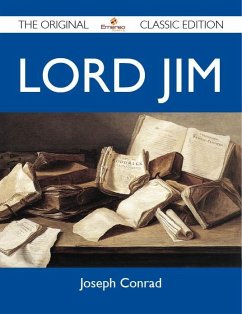This is one of those books that anybody who has been through high school should have been exposed to. I remember being assigned this book as a junior or senior and bluffing my way through without really reading it. I even got a literature degree without reading it. Finally, after many years, I felt that I should give the novel its due, and picked up a copy.
The novel is the story of Jim, an overly romantic seaman, who during a moment of crisis loses his courage. He is first mate on a pilgrim ship bound for Mecca and after the ship collides with an unseen object and is in danger of sinking, he abandons ship leaving the human cargo to fend for its own. He is dogged by his guilt and spends years drifting around the East trying to find the right occasion by which he might redeem himself. Eventually he ends up in the forests of Malaysia where he becomes a god-like protector of the indigenous people and is given the title of Lord. But no matter how successful Jim might appear to his followers, and to the omnipresent narrator of the novel, he still cannot forget his moment of weakness. Jims self-centeredness prevents him from moving forward with his life and condemns him to a life of voluntary exile, all the time proclaiming that he is not good enough to live in the outside world. He is willing to risk all future happiness and fortune to be able to face his demons once again without losing his nerves. Ironically, it is his last heroic act that destroys all the good that Jim has painstakingly built up, essentially bringing chaos to his Eden like world.
Published at the very beginning of the twentieth century, Lord Jim, in many ways anticipated the experimental writing techniques that would be brought to fruition in the works of Joyce, Faulkner, and others. Conrad is not only interested in telling a tale, he is interested in different points of view, nonlinear narrative techniques, and solving the complexities inherent in a tale within a tale formula. Although some readers might find Conrads prose a little tedious, perseverence and careful reading will reveal passages of unexpected beauty that will cause the reader to pause -- then slowly re-read.
The novel is the story of Jim, an overly romantic seaman, who during a moment of crisis loses his courage. He is first mate on a pilgrim ship bound for Mecca and after the ship collides with an unseen object and is in danger of sinking, he abandons ship leaving the human cargo to fend for its own. He is dogged by his guilt and spends years drifting around the East trying to find the right occasion by which he might redeem himself. Eventually he ends up in the forests of Malaysia where he becomes a god-like protector of the indigenous people and is given the title of Lord. But no matter how successful Jim might appear to his followers, and to the omnipresent narrator of the novel, he still cannot forget his moment of weakness. Jims self-centeredness prevents him from moving forward with his life and condemns him to a life of voluntary exile, all the time proclaiming that he is not good enough to live in the outside world. He is willing to risk all future happiness and fortune to be able to face his demons once again without losing his nerves. Ironically, it is his last heroic act that destroys all the good that Jim has painstakingly built up, essentially bringing chaos to his Eden like world.
Published at the very beginning of the twentieth century, Lord Jim, in many ways anticipated the experimental writing techniques that would be brought to fruition in the works of Joyce, Faulkner, and others. Conrad is not only interested in telling a tale, he is interested in different points of view, nonlinear narrative techniques, and solving the complexities inherent in a tale within a tale formula. Although some readers might find Conrads prose a little tedious, perseverence and careful reading will reveal passages of unexpected beauty that will cause the reader to pause -- then slowly re-read.
Dieser Download kann aus rechtlichen Gründen nur mit Rechnungsadresse in A, D ausgeliefert werden.


